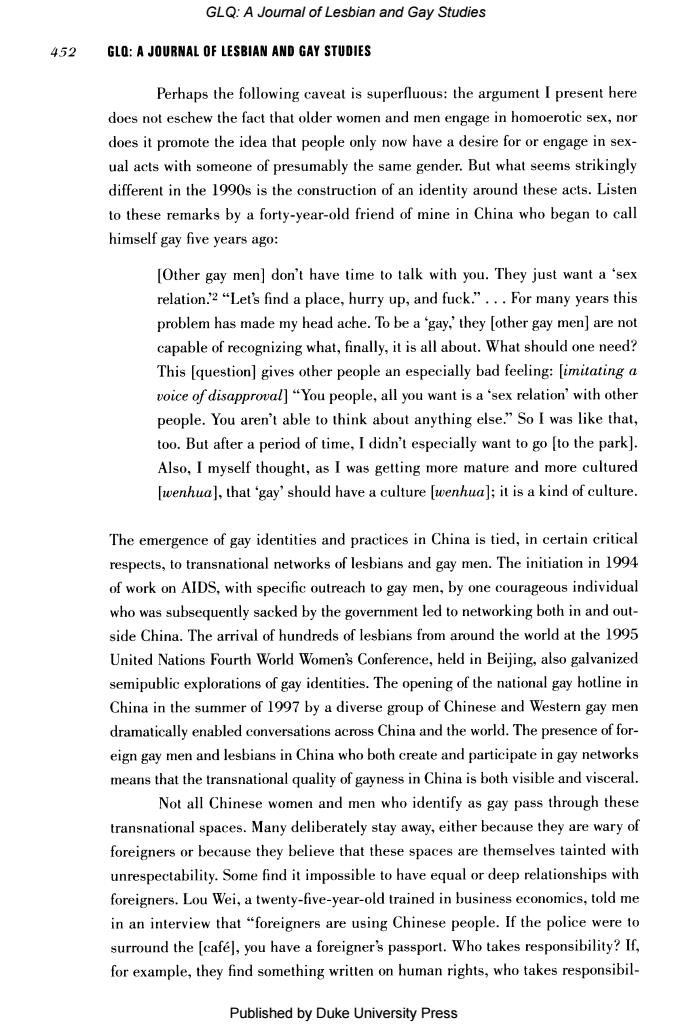正在加载图片...

GLQ:A Joumal of Lesbian and Gay Studies 452 GLQ:A JOURNAL OF LESBIAN AND GAY STUDIES Perhaps the following caveat is superfluous:the argument I present here does not eschew the fact that older women and men engage in homoerotic sex,nor does it promote the idea that people only now have a desire for or engage in sex- ual acts with someone of presumably the same gender.But what seems strikingly different in the 1990s is the construction of an identity around these acts.Listen to these remarks by a forty-year-old friend of mine in China who began to call himself gay five years ago: [Other gay men]don't have time to talk with you.They just want a 'sex relation.2"Let's find a place,hurry up,and fuck."...For many years this problem has made my head ache.To be a 'gay,'they [other gay men]are not capable of recognizing what,finally,it is all about.What should one need? This [question]gives other people an especially bad feeling:[imitating a voice ofdisapproval]"You people,all you want is a'sex relation'with other people.You aren't able to think about anything else."So I was like that, too.But after a period of time,I didn't especially want to go [to the park]. Also,I myself thought,as I was getting more mature and more cultured [wenhua],that 'gay'should have a culture [wenhua];it is a kind of culture. The emergence of gay identities and practices in China is tied,in certain critical respects,to transnational networks of lesbians and gay men.The initiation in 1994 of work on AIDS,with specific outreach to gay men,by one courageous individual who was subsequently sacked by the government led to networking both in and out- side China.The arrival of hundreds of lesbians from around the world at the 1995 United Nations Fourth World Women's Conference,held in Beijing,also galvanized semipublic explorations of gay identities.The opening of the national gay hotline in China in the summer of 1997 by a diverse group of Chinese and Western gay men dramatically enabled conversations across China and the world.The presence of for- eign gay men and lesbians in China who both create and participate in gay networks means that the transnational quality of gayness in China is both visible and visceral. Not all Chinese women and men who identify as gay pass through these transnational spaces.Many deliberately stay away,either because they are wary of foreigners or because they believe that these spaces are themselves tainted with unrespectability.Some find it impossible to have equal or deep relationships with foreigners.Lou Wei,a twenty-five-year-old trained in business economics,told me in an interview that"foreigners are using Chinese people.If the police were to surround the [cafe],you have a foreigner's passport.Who takes responsibility?If, for example,they find something written on human rights,who takes responsibil- Published by Duke University Press452 GLQ: A JOURNAL OF LESBIAN AND GAY STUDIES Perhaps the following caveat is superfluous: the argument I present here does not eschew the fact that older women and men engage in homoerotic sex, nor does it promote the idea that people only now have a desire for or engage in sexual acts with someone of presumably the same gender. But what seems strikingly different in the 1990s is the construction of an identity around these acts. Listen to these remarks by a forty-year-old friend of mine in China who began to call himself gay five years ago: [Other gay men] don’t have time to talk with you. They just want a ‘sex relation.’2 “Let’s find a place, hurry up, and fuck.” . . . For many years this problem has made my head ache. To be a ‘gay,’ they [other gay men] are not capable of recognizing what, finally, it is all about. What should one need? This [question] gives other people an especially bad feeling: [imitating a voice of disapproval] “You people, all you want is a ‘sex relation’ with other people. You aren’t able to think about anything else.” So I was like that, too. But after a period of time, I didn’t especially want to go [to the park]. Also, I myself thought, as I was getting more mature and more cultured [wenhua], that ‘gay’ should have a culture [wenhua]; it is a kind of culture. The emergence of gay identities and practices in China is tied, in certain critical respects, to transnational networks of lesbians and gay men. The initiation in 1994 of work on AIDS, with specific outreach to gay men, by one courageous individual who was subsequently sacked by the government led to networking both in and outside China. The arrival of hundreds of lesbians from around the world at the 1995 United Nations Fourth World Women’s Conference, held in Beijing, also galvanized semipublic explorations of gay identities. The opening of the national gay hotline in China in the summer of 1997 by a diverse group of Chinese and Western gay men dramatically enabled conversations across China and the world. The presence of foreign gay men and lesbians in China who both create and participate in gay networks means that the transnational quality of gayness in China is both visible and visceral. Not all Chinese women and men who identify as gay pass through these transnational spaces. Many deliberately stay away, either because they are wary of foreigners or because they believe that these spaces are themselves tainted with unrespectability. Some find it impossible to have equal or deep relationships with foreigners. Lou Wei, a twenty-five-year-old trained in business economics, told me in an interview that “foreigners are using Chinese people. If the police were to surround the [cafk], you have a foreigner’s passport. Who takes responsibility? If, for example, they find something written on human rights, who takes responsibilGLQ: A Journal of Lesbian and Gay Studies Published by Duke University Press